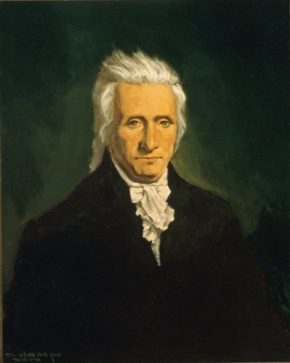You are here
Circuit Court Opinions:
Associate Justice Gabriel Duvall, United States v. Hodges (1815)

United States v. Hodges, 26 F. Cas. 332 (C.C.D. Md. 1815) (No. 15,374) [Fourth Circuit]
Hodges arose from the War of 1812. In 1814, the British invaded Washington, D.C., burning the Capitol and the Executive Mansion. The troops then began to march toward Baltimore. During their advance, five redcoats—four stragglers and a deserter—were captured by civilians in a small Maryland town. Their commander demanded the return of the soldiers by noon the following day, threatening to destroy the town and kill all its residents otherwise. John Hodges, one of the town’s leaders, returned the soldiers to the British. The U.S. government then charged Hodges with treason, alleging that his act constituted giving “aid and comfort” to the enemy.
Hodges was tried in the U.S. circuit court in Maryland before Justice Duvall and U.S. District Judge James Houston. Following the trial, the prosecution requested that the court instruct the jury on the law. Duvall told the jury that the act with which Hodges was charged constituted treason as a matter of law, and that nothing but a direct threat to his own life could justify his conduct. This instruction had the effect of nullifying Hodges’s defense that he had acted in defense of the town. However, Duvall added, “[t]he jury are not bound to conform to this opinion, because they have a right in all criminal cases to decide on the law and the facts.” According to the published report of the case, Judge Houston said that Duvall’s last remark was the only one with which he entirely agreed. Hodges’s attorney disputed Duvall’s instruction, telling the jury that his opinion, “is not, and I thank God for it, the law of this land.” The jury then acquitted Hodges. Hodges illustrates the power juries possessed to disregard judges’ legal instructions in the federal courts of the early republic. This power had begun to erode by the 1830s, and the Supreme Court declared definitively in Sparf and Hansen v. United States (1895) that jurors had a duty to follow the law as explained by the trial judge.
